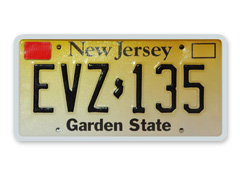Nearly two and a half years ago, New Jersey became the first state to require drivers under age 21 with a permit or provisional (restricted) license to put a state-issued red decal on their vehicle's license plates. The decal law was implemented to help improve car safety and aid in law enforcement. Now a new study from the Children's Hospital of Philadelphia (CHOP) concludes that these decals prevented 1,624 crashes of teens with intermediate licenses in the first year.

Researchers looked at the state license and crash databases from January 1st, 2008, to May 31, 2011, to compare the graduated driver license (GDL) related citations in the two years before implementation of the law and one year after. They found that police citations for not complying with the state's GDL law increased 14 percent and police-reported crashes dropped 9 percent. Multiple-vehicle crashes decreased 8 percent and crashes involving an intermediate driver with teen passengers decreased 9 percent.
Called Kyleigh's Law, the decal program is named after a New Jersey teenager who was killed in a car driven by a driver on probation. Six states--Kentucky, Michigan, Alaska, Iowa, Minnesota, and North Carolina--have considered a decal law, but no bills have been passed.
The decal law is not without controversy. Opponents have argued in court that it is unconstitutional because of age discrimination and that teens would be targeted by police, and possibly predators as well. A judge dismissed the lawsuit, stating that the law does not violate the New Jersey constitution.
New Jersey's GDL program is among the strictest in the nation, and the state also has one of the lowest teen driver crash fatality rates. Decal proponents say the program helped the state realize additional crash reductions.
To see your state's graduated-license requirements, go to the Insurance Institute for Highway Safety's website. There is also a calculator that projects how strengthening certain state-law provisions can help to further reduce crashes and save lives.
For more on teen drivers, see our recent report on the risks of teenagers and older drivers, plus our special section on distracted driving and teen safety.
—Liza Barth





